QuestionQUESTION: Dear Dr. Krempels:
Our 5,5-year-old rex buck Puszek expelled sandy sludge for the first time about 6 months ago. The problem came back this week, when his bladder felt like a bag of sand. We've just come back from a vet who flushed his bladder. After having done some research, I have several questions that I hope you can help with:
1) I know that you and many other rabbit experts believe that it's a metabolic problem that has nothing to do with diet. The first occurrence of the problem happened a month after we switched hay suppliers. Puszek grew up eating Oxbow's Timothy. We then switched to Midwestern grass hay that has between 5 and 20 percent alfalfa (depending on the bale's cut). Do you think introducing some in Puszek's diet alfalfa has nothing to do with the onset of the sludge? (The vet we saw is recommending we go back to Timothy-only. We would do it gladly if Puszek *only* were concerned, but we're hesitating because the grass mix is *much* cheaper for us and because Puszek's partner doesn't like Timothy but likes the fragrant grass hay.)
2) In another post you said that you have a couple of sludge bunnies, too. And that you found "that giving subQ fluids and then waiting about a half hour to jiggle and gently express the bladder can work *wonders* to remove much of the sludge." This gives me hope because we can give subQ and we'd hate to have to have Puszek flushed every month.
How often do you recommend that we give subQ fluids and gently expel?
What's involved in a gentle agitation of the bunny to suspend the crystals before expelling?
Do you have recommendations on how to safely expel the bladder? Are there any concerns with doing that? How do we make sure we aren't running the chance of the bladder bursting?
3) We feed our rabbits only dark leaf greens (mostly cilantro, parsley, and lettuce mixes--sans iceberg). Can we feed our bunny kale and cabbage occasionally? (The vet we saw today said not to do that.)
4) Finally, once rabbits start getting sludgy, does that affect their lifespan? Can this problem be managed long-term? We want our bunny healthy and happy and hopping as long as possible.
Thank you very much for all you do for lagomorphs.
Agnieszka Tennant
Many bunnies will eventually even learn to cooperate and void with gentle pressure. It's a big relief when that sludge is out
ANSWER: Dear Agnieszka,
1. I have to side with the vet and recommend returning to the timothy hay, or at least getting grass hay without alfalfa in it. It's really the alfalfa that's high in calcium, and removing that will probably help.
2. Bladder expression isn't to be done lightly, as you can injure the bunny if you don't do it correctly. We did it about once a week, at first, and then the problem gradually went away on its own (go figure!). To agitate the bladder, you hold the lower abdomen very gently between thumb and other fingers, and wiggle it side to side, and then tap upwards very gently: just to get the fluid in the bladder sloshing around to suspend the sludge as much as possible before expressing.
I cannot really safely explain how to do a bladder expression in writing. The best idea would be to have your rabbit-savvy vet *show* you how. It must be done very gently, and never forcing anything. Our bunny Hamish eventually learned to help when he felt the pressure of the expression, and would tighten his abdominal muscles and open up when we did the procedure. (Bunnies are so smart!)
3. This is such a controversial area. Many rabbit expert vets feel that dietary calcium has almost nothing to do with bladder sludge or other renal calcium problems, and that changing the diet makes no difference. This has been my personal experience. But others believe that if the diet is very high in calcium (e.g., high in alfalfa and calcium-rich greens), that reducing these can help. The jury is really still out on this.
We've never had problems with Kale. But the calcium content in kale varies, depending on where it's grown, too.
Because NO ONE really knows whether dietary calcium affects bladder sludge, I really can't confidently make a recommendation about this. (And if the vet is truly honest, she can't, either. But she's erring on the side of caution.)
4. Hamish lived to be 14, and he had sludge for years. I've not seen any evidence that the sludge itself will shorten the lifespan. It can just make maintenance a bit more demanding.
The problem is that sometimes sludge is a sign of metabolic bone disease, and this can cause things like osteoporosis, loosening of the teeth in their sockets, etc. And the latter can foster tooth root abscesses. This doesn't happen in every case, of course, but it's more likely.
We found that outdoor play time in the sun and the chance to eat natural grass and twigs can really help in this area. Sunlight affects vitamin D metabolism, which, in turn, affects calcium metabolism. So if you can swing some supervised outdoor play time, that can only help.
Hope this gives you some ideas. Good luck!
Dana
---------- FOLLOW-UP ----------
QUESTION: Thank you for these good ideas. They give me hope.
Are you aware if any vets recommend vitamin D supplements for rabbits with sludge? (Sunshine is not always easy to come by up north.) We used to run the bunnies outside but stopped a month ago at the urging of some HRS people, due to fears regarding fly infestations and picking up diseases outdoors. We hated to do that because our bunnies loved binkying in our yard (untreated grass, under supervision).
Also, do you know anything about the daily supplement of Polycitra, which is supposed to help prevent crystals from forming?
Thank you.
Agnieszka
AnswerDear Agnieszka,
I'm actually on the board of HRS, so I know the official recommendations about bunnies being indoors. But from personal experience, I can tell you that rabbits who get free run outdoors regularly tend to be much healthier than those who are always inside. We have rescued sanctuary jackrabbits in our (big) yard, and they would kill themselves if they were forced to stay indoors. So we keep the sliding doors partly open (with a Home-Depot style plastic barrier to create a "hare door" that keeps the AC in), and that means that most of the indoor rabbits have constant access to the outdoors, too. Those that choose to spend some time outside (they all come in when they get hot or scared) just don't tend to have health problems.
Our little Kali had HORRIBLE sludge when she was a house bunny. But now that she spends several hours outside each day, the problem is really managed. Maybe it's the sun? Maybe it's the exercise? All I can say is that it's made a huge difference for her.
Yes, fly strike can be a risk. But all you need to do is inspect the buns for any sign of poopy butt or damp fur before they go out, and if you want to be *really* careful, give them a light dusting (worked into the fur) of baby cornstarch (as opposed to baby talcum powder) into the fur on their bums and undersides. You'll have no problems. And it's a good idea to inspect them (with your fingers, since fly eggs can be hard to see--the flies lay eggs deep in the fur) for any problems. But it's a problem that can be avoided with good "management."
The only other threat would be Baylisascaris if raccoons leave feces in your yard, or perhaps coccidia or roundworms from wild cottontails, if they come into your yard. But if you can designate a bunny-safe area, then the benefits of sunshine and exercise outweigh the small risk, if you ask me.
Just my opinion, for what it's worth.
Vitamin D supplements are a bit dicey. All mammals manufacture their own, so it's not an essential nutrient. And it's fat soluble, so you *can* overdose. I've not heard of anyone trying supplements in a rabbit. Sunshine lets the body manage its own supply, and you really don't need much sun per day: perhaps 15-30 minutes.
I have heard of people using polycitra to help dissolve kidney and bladder stones, but have not used it myself. People who have used it have reported success. I'm not sure it will prevent crystals from forming, but it might acidify the bladder enough to keep them smaller and easier to pass. I suppose it couldn't hurt to ask your vet about trying it.
Good luck!
Dana

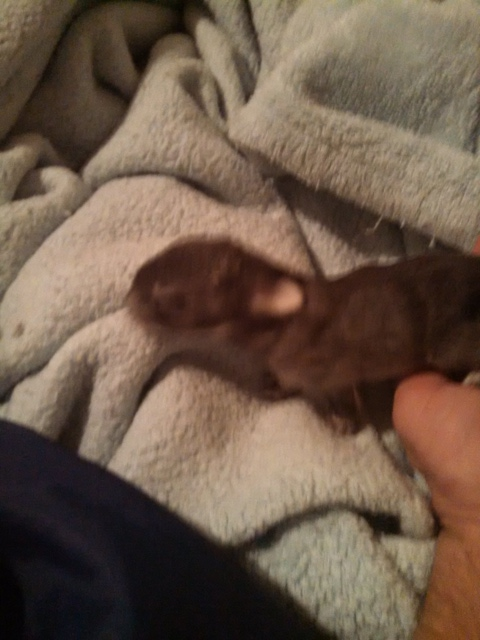 baby Buns
Question
2 weeks old 2 weeks old
Hi,
I hav
baby Buns
Question
2 weeks old 2 weeks old
Hi,
I hav
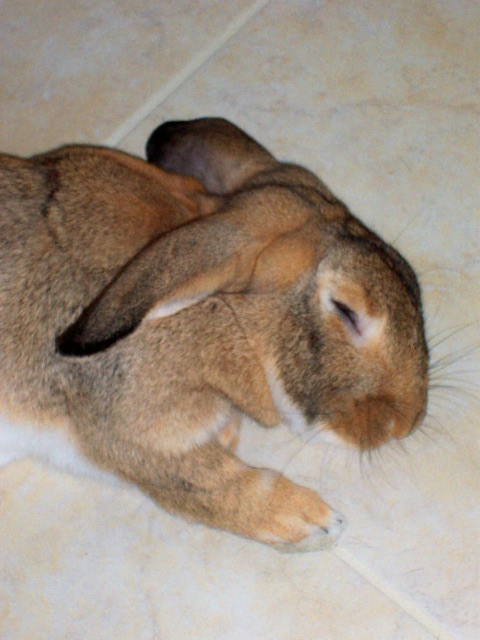 Bulges at Base of Ears
Question
Leroy with Bulges Leroy without Bulges &
Bulges at Base of Ears
Question
Leroy with Bulges Leroy without Bulges &
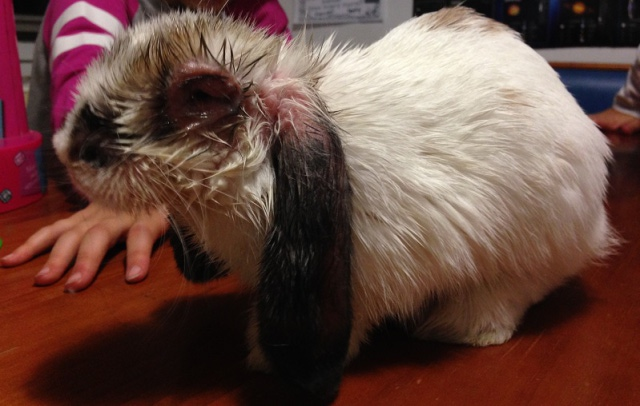 My rabbit has Myxomatosis - day 14
Question
Bunny
Hi there,
My 4 month old dwarf fl
My rabbit has Myxomatosis - day 14
Question
Bunny
Hi there,
My 4 month old dwarf fl
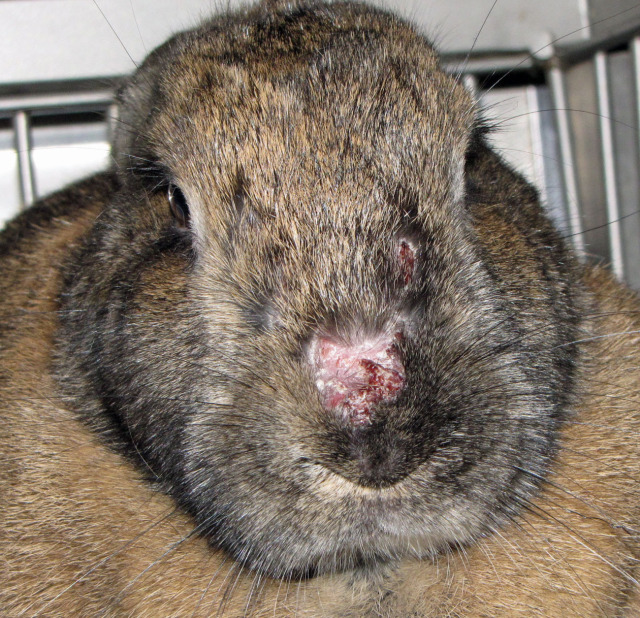 Persistent scabby nose
QuestionQUESTION: I volunteer at an animal shelter givi
Persistent scabby nose
QuestionQUESTION: I volunteer at an animal shelter givi
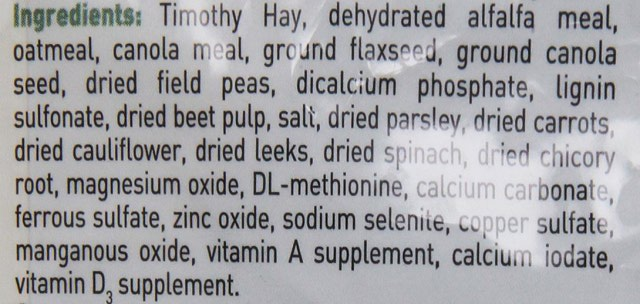 Rabbit pellets
Question
Ingredients
I am always concerned about
Rabbit pellets
Question
Ingredients
I am always concerned about